Filter by
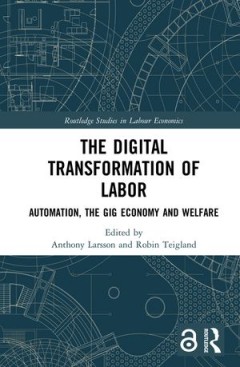
The Digital Transformation of Labor : Automation, the Gig Economy and Welfare…
Through a series of studies, the overarching aim of this book is to investigate if and how the digitalization/digital transformation process causes (or may cause) the autonomy of various labor functions, and its impact in creating (or stymieing) various job opportunities on the labor market. This book also seeks to illuminate what actors/groups are mostly benefited by the digitalization/digital…
- Edition
- -
- ISBN/ISSN
- -
- Collation
- -
- Series Title
- -
- Call Number
- 650
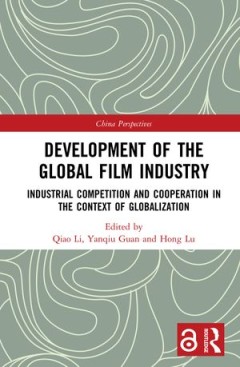
Development of the Global Film Industry : Industrial Competition and Cooperat…
The global film industry has witnessed significant transformations in the past few years. Regions outside the USA have begun to prosper while non-traditional production companies such as Netflix have assumed a larger market share and online movies adapted from literature have continued to gain in popularity. How have these trends shaped the global film industry? This book answers this question …
- Edition
- -
- ISBN/ISSN
- 9781000092424
- Collation
- -
- Series Title
- -
- Call Number
- 650
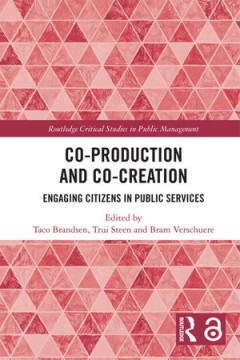
Co-Production and Co-Creation : Engaging Citizens in Public Services
Co-production and co-creation occur when citizens participate actively in delivering and designing the services they receive. It has come increasingly onto the agenda of policymakers, as interest in citizen participation has more generally soared. Expectations are high and it is regarded as a possible solution to the public sector’s decreased legitimacy and dwindling resources, by accessing m…
- Edition
- -
- ISBN/ISSN
- 9781351792578,
- Collation
- -
- Series Title
- -
- Call Number
- 650
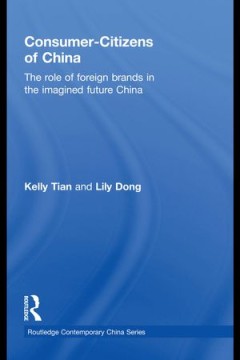
Consumer-Citizens of China : The Role of Foreign Brands in the Imagined Futur…
This book presents a comprehensive examination of Chinese consumer behaviour and challenges the previously dichotomous interpretation of the consumption of Western and non-Western brands in China. The dominant position is that Chinese consumers are driven by a desire to imitate the lifestyles of Westerners and thereby advance their social standing locally. The alternative is that consumers reje…
- Edition
- -
- ISBN/ISSN
- 9780415553490
- Collation
- -
- Series Title
- -
- Call Number
- 650

Competition and Cooperation in Economics and Business
Asia and the Pacific have become the growth engine of the world economy with the contribution of two-third of the global growth. The book discusses current issues in economics, business, and accounting in which economic agents, as individuals, entrepreneurs and professionals, as well as countries in the Asia and Pacific regions compete and collaborate with each other and with the rest of the gl…
- Edition
- -
- ISBN/ISSN
- 9781138626669
- Collation
- -
- Series Title
- -
- Call Number
- 650

Climate Change and Natural Disasters
The start of the new millennium will be remembered for deadly climate-related disasters - the great floods in Thailand in 2011, Super Storm Sandy in the United States in 2012, and Typhoon Haiyan in the Philippines in 2013, to name a few. In 2014, 17.5 million people were displaced by climate-related disasters, ten times more than the 1.7 million displaced by geophysical hazards. What is causing…
- Edition
- -
- ISBN/ISSN
- 9781138567351
- Collation
- -
- Series Title
- -
- Call Number
- 650
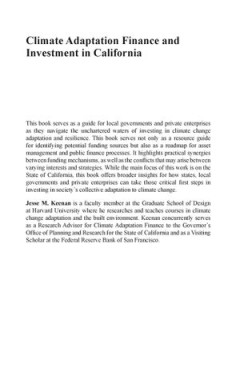
Climate Adaptation Finance and Investment in California
This book serves as a guide for local governments and private enterprises as they navigate the unchartered waters of investing in climate change adaptation and resilience. This book serves not only as a resource guide for identifying potential funding sources but also as a roadmap for asset management and public fi nance processes. It highlights practical synergies between funding mechanisms, a…
- Edition
- -
- ISBN/ISSN
- 9780367026073
- Collation
- -
- Series Title
- -
- Call Number
- 650
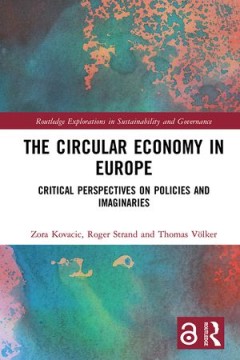
The Circular Economy in Europe : Critical Perspectives on Policies and Imagin…
The Circular Economy in Europe presents an overview and a critical discussion on how circularity is conceived, imagined, and enacted in current EU policy-making. In 2013, the idea of a circular economy entered the stage of European policy-making in the efforts to reconcile environmental and economic policy objectives. In 2019 the European Commission declared in a press release that the Circular…
- Edition
- -
- ISBN/ISSN
- 9780429578724
- Collation
- -
- Series Title
- -
- Call Number
- 650
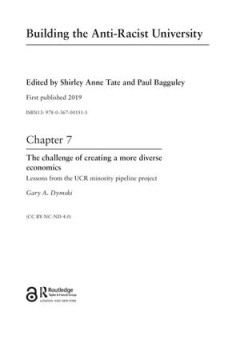
Chapter 7 The challenge of creating a more diverse economics
This paper reflects on the experience of the 1999–2002 minority pipeline program (MPP) at the University of California, Riverside. With support from the American Economic Association, the MPP identifi ed students of color interested in economics, let them explore economic issues aff ecting minority communities, and encouraged them to consider postgraduate work in economics. The MPP’s succes…
- Edition
- -
- ISBN/ISSN
- 9780367001513
- Collation
- -
- Series Title
- -
- Call Number
- 650

Benefit-sharing in Environmental Governance : Local Experiences of a Global C…
Taking a bottom-up perspective, this book explores local framings of a wide range of issues related to benefit-sharing, a growing concept in global environmental governance.Benefit-sharing in Environmental Governance draws on original case studies from South Africa, Namibia, Greece, Argentina, and Malaysia to shed light on what benefit-sharing looks like from the local viewpoint. These local-le…
- Edition
- -
- ISBN/ISSN
- 9780429584176
- Collation
- -
- Series Title
- -
- Call Number
- 650
 Computer Science, Information & General Works
Computer Science, Information & General Works  Philosophy & Psychology
Philosophy & Psychology  Religion
Religion  Social Sciences
Social Sciences  Language
Language  Pure Science
Pure Science  Applied Sciences
Applied Sciences  Art & Recreation
Art & Recreation  Literature
Literature  History & Geography
History & Geography